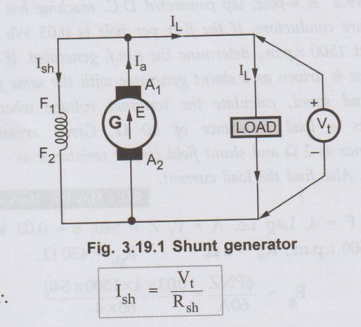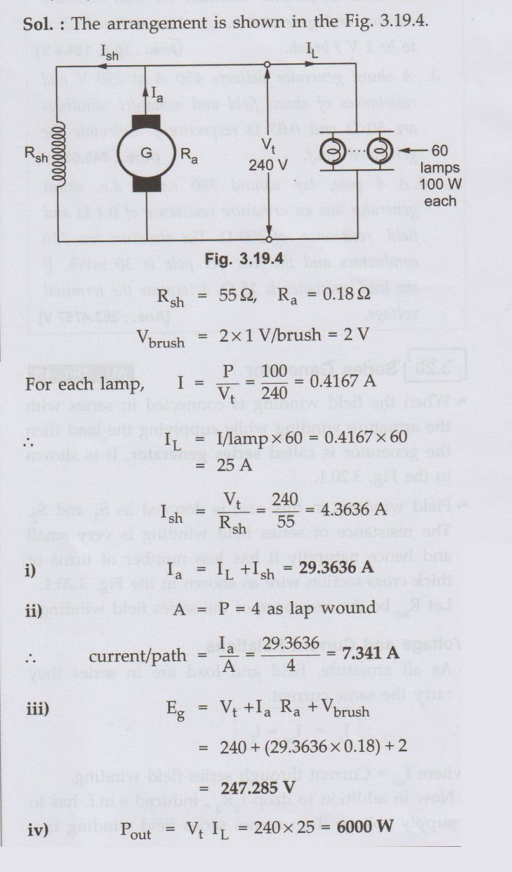Electrical Machines: Unit II: D.C. Generators
Shunt Generator
with Example Problems | DC Generators
When the field winding is connected in parallel with the armature and the combination across the load then the generator is called shunt generator.
Shunt
Generator
AU: May-04,05,07,09,14,15,17,
Dec.-04,08,18
•
When the field winding is connected in parallel with the armature and the
combination across the load then the generator is called shunt generator.
•
The field winding has large number of turns of thin wire so it has high
resistance. Let Rsh be the resistance of the field winding.
1. Voltage and Current Relations
From
the Fig. 3.19.1, we can write
Ia
= IL + Ish
Now
voltage across load is Vt which is same across field winding as both
are in parallel with each other.

ஃ Ish = Vt
/ Rsh
While
induced e.m.f E, Still requires to supply voltage drop IaRa
and bbrush contact drop.
•ஃ E
= Vt + IaRa + Vbrush Where E = ϕ P N Z / 60 A
In
practice, brush contact drop can be neglected.
Ex 3.19.1 A 4 pole lap wound d.c. shunt
generator has a useful flux/pole of 0.6 Wb. The armature winding consists of
200 turns, each turn having a resistance of 0.003 Ω, calculate the terminal
voltage when running at 1000 r.p.m. if armature current is 45 A. AU: Nov.-04, Marks 8
Sol.

Ex. 3.19.2
A 4-pole, lap connected D.C. machine has
540 armature conductors. If the flux per pole is 0.03 Wb and runs at 1500
r.p.m., determine the e.m.f. generated. If this machine is driven as a shunt
generator with the same field flux and speed, calculate the terminal voltage
when it supplies a load resistance of 40 Ω. Given armature resistance as 2Ω and
shunt field circuit resistance as 450 Ω. Also find the load current. AU: May-07, Marks 8
Sol.

Ex. 3.19.3
A 4 pole DC shunt generator, with a shunt
field resistance of 100 ohms and an armature resistance of 1 ohm, has 378 wave
connected conductors in its armature. The flux per pole is 0.02 Wb. If a load
resistance of 10 Ω is connected across the armature terminals and the generator
is driven at 1000 rpm. Calculate power absorbed by the load.
AU: May-09, Dec.-11,18, Marks 13
Sol.
The generator is shown in the Fig. 3.19.3.

Ex. 3.19.4
A 4-pole, lap wound d.c. machines has 728
armature conductors. Its field winding is excited from a dc source to create an
air gap flux of 32 mWb/pole. The machine is run from a prime mover at 1600
r.p.m. It supplies a current of 100 A to an electric load.
1) Calculate the elctromagnetic
power developed.
2) What is the mechanical power
that is fed from the prime mover to the generator?
3) What is the torque provided by
the prime mover?
AU: Dec.- 08, May-14, Marks 8
Sol.

Ex.3.19.5
A four pole lap wound shunt generator supplies 60 lamps of 100 W240 V each
the field and armature resistance are 55 Ω and 0.18 Ω respectively. If the
brush drop is 1V for each brush find i) Armature current ii) Current per path
iii) Generated emf iv) Power output of DC machine.
Sol :
The arrangement is shown in the fig 3.19.4

Review Questions
1. A 110 V, d.c.
shunt generator delivers a load of 50 A. The armature resistance is 0.2 Ω and
field resistance is 55 Ω. The generator is driven at 1800 r.p.m. It has 6 poles
with 360 conductors connected in lap fashion. Calculate
i) The no load voltage
ii) The flux per pole
(Ans. : i) 120.4 V
ii) 0.011 Wb)
2. A 4 pole, 100 V d.c. shunt generator with lap connected armature having field and armature resistances of 50 Ω and 0.1 Ω respectively, supplied 60, 100 V, 40 W lamps. All lamps are connected in parallel. Calculate the total armature current and generated e.m.f. Assume brush drop to be 1 V/ brush.
(Ans.: 26 A, 104.6
V)
3. A shunt generator delivers 450 A at 230 V and resistances of shunt field and armature windings are 50 Ω and 0.03 Ω respectively. Calculate the o generated e.m.f.
(Ans.: 243.638 V)
4. A 4 pole, lap wound 750 r.p.m. d.c. shunt generator has an armature resistance of 0.4 Ω and field resistance of 200 Ω. The armature has 720 conductors and the flux per pole is 30 mWb. If the load resistance is 15 Ω, determine the terminal voltage.
[Ans. 262.4757 V]
Electrical Machines: Unit II: D.C. Generators : Tag: : with Example Problems | DC Generators - Shunt Generator
Related Topics
Related Subjects
Electrical Machines I
EE3303 EM 1 3rd Semester EEE Dept | 2021 Regulation | 3rd Semester EEE Dept 2021 Regulation
